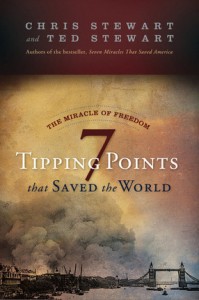As a homeschooling mom of teens, one of my goals is to have a broad overview of history to help us put individual facts into context. That’s why I enjoyed 7 Tipping Points that Saved the World, a book that whizzes through the past showcasing 7 critical events in the history of freedom.
Did you know that as many as 95% of the people that have ever lived have not enjoyed the blessing of freedom? We take freedom for granted because we do not know how rare it is. Now, with rule of law (i.e. respect for law by all classes of society, including leaders) quickly eroding in the US, and basic liberties under attack in much of the world, it may be time to understand the great gift of freedom.
What’s more, in troubled times it’s important to understand the reality of Psalm 2. God does have the whole world in his hands, and he does laugh at the posturing of those who think they control the world. There are reasons for it all, on both personal and global levels, and 7 Tipping Points that Saved the World shows just one behind-the-scenes thread.
This book examines the history of the miracle of freedom, focusing on some major watersheds. Authors Chris Steward and Ted Steward point out that the development of freedom and democracy would have been impossible without 7 great and unlikely events:
- The failure of the Assyrians in their quest to destroy the kingdom of Judah.
- The victory of the Greeks over the Persians at Thermopylae and Salamis.
- The Roman Emperor Constantine’s conversion to Christianity.
- The defeat of the armies of Islam at Poitiers.
- The failure of the Mongols in their effort to conquer Europe.
- The discovery of the New World.
- The Battle of Britain in World War II.
Now, one could argue that other events were even more important in the development of freedom—the birth, death, and resurrection of Jesus Christ, for example, and the printing press—but no one can deny that each of the seven events mentioned by the Stewards represented a critical juncture in the development of the freedom we enjoy today.
Using accurate, gripping stories as well as historical narratives, the Stewarts portray the desperate cruelty of the Assyrians and Mongols, the bravery of the Spartans and the RCAF fighters, and much more. In each case, the ‘tipping point event’ was unlikely, and in each case it made a critical difference to the eventual development of freedom, rule of law, and democracy.
While studying history, we can get lost in details. 7 Tipping Points that Saved the World will help homeschooling moms and students of history see the big picture in a unique way. Although not written as a Christian book, it fills me with a passion to show my children God’s hand in history, even when times seem desperate.
I highly recommend 7 Tipping Points that Saved the World for any adult or older teen interested in history, politics, culture, or religion.
Note that the stories are, on occasion, so realistically gruesome that this book should not be given to young teens. Older teens and adults, however, can only benefit from reading it.
Note also that this book is extremely US-centric. While that’s a bit bemusing for a Canadian with strong European ties, it does not detract much from its main point and its stories.
This is yet another book in the in the 2013 52 Books in 52 Weeks Challenge and is also linked to Saturday Reviews and Trivium Tuesdays.
Disclosure: I borrowed this book from our library; the review represents my own honest opinions and I receive no compensation for writing it.


Thank you! I’ll see if my library has it.
Just want to add some perspective. This book is written for the same reason movies are. Entertainment. it’s “pop history” DO NOT take everything as gospel. For example you stated 95% Of people who have ever lived, did not have freedom… False. Most of the worlds population lived in tribal society, pure democracy in many ways. The book does certainly get a lot right but it is written by politicians and soldiers, not historians and it shows.